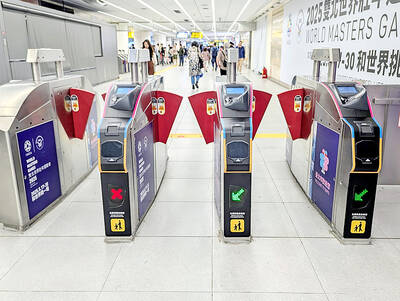Flying in from New York, the president's son Chen Chih-chung (陳致中) and his wife Huang Jui-ching (黃睿靚) arrived in Taipei at 10:21 last night, ending weeks of speculation on whether the couple would have their first born in the US.
According to a TVBS report earlier yesterday, Chen, while transiting at Japan's Narita Airport, said that he and his wife had always planned to have their baby in Taiwan and didn't understand why there were so many rumors to the contrary.
Asked about an accusation that he had applied as an immigrant investor, Chen said he had never considered acquiring a US green card and that he still holds a student visa.
He said the accusations made by Chinese Nationalist Party (KMT) Legislator Chiu Yi (
Chen, who was in the US with Huang for optional practical training for a law firm has been under attack for the rumor that they would not have their first baby at home
The wrangling over the dual nationality of members of politicians' families started back in 2000 when Chen attacked then independent candidate James Soong (宋楚瑜), whose son Soong Chen-yuan (宋鎮遠) is a US citizen, during the presidential election campaign.
Meanwhile, DPP legislator Yeh Yi-chin (
DPP Legislator Wang Shih-cheng (
also see story:
Editorial: Whose womb is it anyway?

A magnitude 6.4 earthquake struck off the coast of Hualien County in eastern Taiwan at 7pm yesterday, the Central Weather Administration (CWA) said. The epicenter of the temblor was at sea, about 69.9km south of Hualien County Hall, at a depth of 30.9km, it said. There were no immediate reports of damage resulting from the quake. The earthquake’s intensity, which gauges the actual effect of a temblor, was highest in Taitung County’s Changbin Township (長濱), where it measured 5 on Taiwan’s seven-tier intensity scale. The quake also measured an intensity of 4 in Hualien, Nantou, Chiayi, Yunlin, Changhua and Miaoli counties, as well as

Credit departments of farmers’ and fishers’ associations blocked a total of more than NT$180 million (US$6.01 million) from being lost to scams last year, National Police Agency (NPA) data showed. The Agricultural Finance Agency (AFA) said last week that staff of farmers’ and fishers’ associations’ credit departments are required to implement fraud prevention measures when they serve clients at the counter. They would ask clients about personal financial management activities whenever they suspect there might be a fraud situation, and would immediately report the incident to local authorities, which would send police officers to the site to help, it said. NPA data showed

ENERGY RESILIENCE: Although Alaska is open for investments, Taiwan is sourcing its gas from the Middle East, and the sea routes carry risks, Ho Cheng-hui said US government officials’ high-profile reception of a Taiwanese representative at the Alaska Sustainable Energy Conference indicated the emergence of an Indo-Pacific energy resilience alliance, an academic said. Presidential Office Secretary-General Pan Men-an (潘孟安) attended the conference in Alaska on Thursday last week at the invitation of the US government. Pan visited oil and gas facilities with senior US officials, including US Secretary of the Interior Doug Burgum, US Secretary of Energy Chris Wright, Alaska Governor Mike Dunleavy and US Senator Daniel Sullivan. Pan attending the conference on behalf of President William Lai (賴清德) shows a significant elevation in diplomatic representation,

The Taipei MRT is to begin accepting mobile payment services in the fall, Taipei Rapid Transit Corp said on Saturday. When the company finishes the installation of new payment units at ticketing gates in October, MRT passengers can use credit cards, Apple Pay, Google Pay and Samsung Pay, the operator said. In addition, the MRT would also provide QR payment codes — which would be compatible with Line Pay, Jkopay, iPass Money, PXPay Plus, EasyWallet, iCash Pay, Taiwan Pay and Taishin Pay — to access the railway system. Currently, passengers can access the Taipei MRT by buying a single-journey token or using EasyCard,